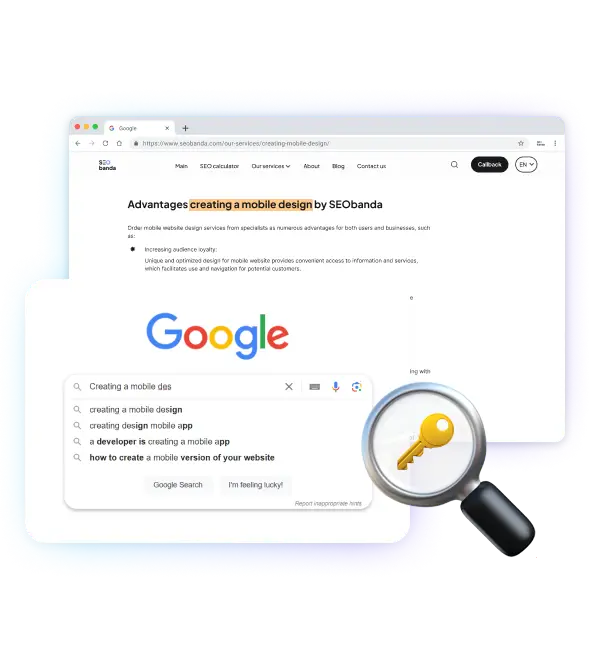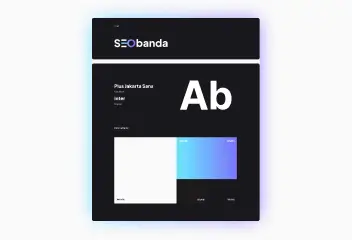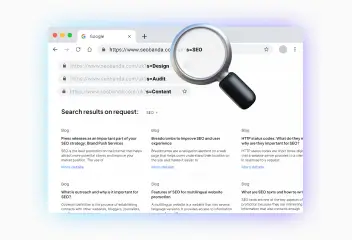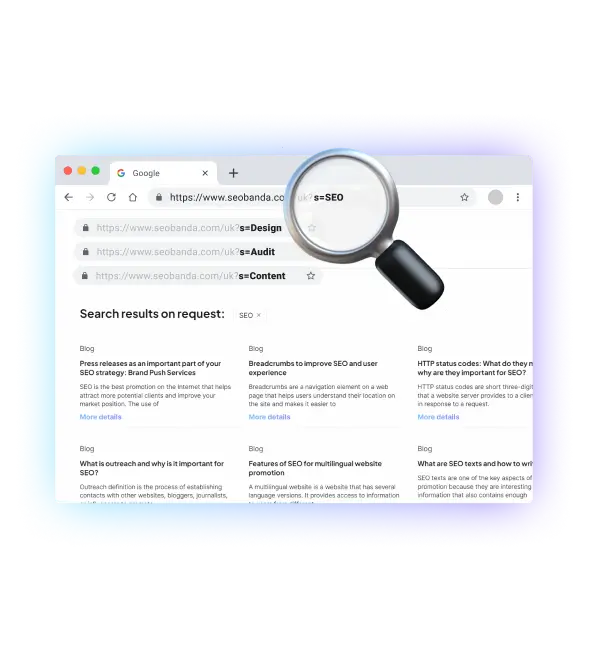What are keywords and how to use them?
Keywords or phrases are individual words or combinations of words that users enter into search engines to find the information they need. Any query in search engines can be a keyword, and the task of SEO specialists is to analyze these queries and organically implement them on the website.





Types of keywords
- Broad or general keywords: any general terms such as “shoes” or “cars”. They have a high search volume and high competition. You will definitely use such keywords in the text, but there is no point in ranking for them because they do not show the user’s intent. If a person writes “shoes” in the search bar, you don’t understand what they want (to buy shoes, just to see the types, if they buy them, for whom, and so on). And if you don’t know what the user wants to see, you won’t be able to provide them with a relevant answer.
- Long-tail keywords: more specific queries, such as “women’s Nike sports shoes.” They are searched less often, but they have a higher conversion rate. If a user is looking for something specific (for example, those same Nike sneakers), they already know exactly what they want and are ready to buy it. Your job is to give them the opportunity to do so. Long-tail keywords are often used in contextual advertising because the cost per click is low, but the conversion rate can be significant.
- Geographical keywords: include the location, for example, “restaurants in Kyiv”. Such keys are very important for local SEO to bring customers to physical stores, cafes, restaurants, etc.
- Brand keywords: related to a specific brand or product, for example, “iPhone 13” or “SEObanda“.

Increase visibility
for your business: SEO solution for growth!


How to find keywords in the text?
Manual text analysis
- Analyze the headings. If the text is set up correctly, the H1 heading should contain the most common keyword and be immediately visible. For example, in our case, it is clear that the article is about keywords. We analyze the H1 and see “keywords”, this is the most common key phrase.
- Read the text: Read the text carefully and highlight words and phrases that are repeated or important.
- Identify key themes: Pay attention to the main themes that are described in the text.
You will probably be able to find the keywords in the text easily on your own, but if you have difficulty, you can use another option.
Using tools for keyword analysis
- Google Keywords Planner: a tool that helps you find popular keywords for specific topics.
- Ahrefs: allows you to analyze keywords on your website and competitors’ websites.
- SEMrush: provides detailed keyword analysis, including search volume and competitiveness.
- WordCounter.net: helps to count the frequency of words in the text and highlight the most frequently used words.


What are keywords for?
Search engines use complex algorithms to index pages and determine their relevance. This is how they work with keywords:
- Indexing: search engines crawl each page and index their content (store it on their servers and display it when needed).
- Content analysis: algorithms analyze text, images, meta tags, and other elements to understand what the page is about.
- Relevance: search engines compare keywords on a page with user search queries and determine the relevance of the page to a specific query (i.e., how well the page content answers the user’s request).
- Ranking: pages are ranked by relevance, website authority, and other factors.
In other words, search engines use keywords to understand how well the content of a particular page meets the user’s request. The task of search engines is to provide users with what they want to see as quickly and efficiently as possible, so the correct use of keywords is very important for this!

Increase visibility
for your business: SEO solution for growth!


How to use keywords correctly?

- Keyword research. First, you need to collect the semantic core. That is, analyze what people ask when they search for your product or information about it. Usually, you collect the semantic core of competitors or simply analyze the most frequent keywords in a particular industry.
- Choosing the right keywords. Analyze the keywords, clean and cluster the semantic core (this means removing unnecessary keywords and phrases, and dividing the remaining ones into groups). Use only those keys that are most relevant to your product or service to organically add them to the site.
- Write keywords in meta tags. When a user writes their query in the search box and sees the same in the Title and Description of your site, they are more likely to click on the link.
- Use of keywords in headings. Include the main keyword in the H1 heading (it is advisable to do this with a direct occurrence, that is, write it exactly as users ask). Use other keywords and their variations in the subheadings H2, H3.
- Use keywords in the URL of the page. Create short, simple, and clear URLs that reflect the content of the page and contain keywords. Then both search engines and users will trust this information more.
- Use keywords in the text. Start the first paragraph with the main keyword (so that it duplicates H1). For example.
- Н1: “What are keywords?”
- The beginning of the first paragraph: “Keywords are…”
Use keywords organically, do not write them separated by commas throughout the text. They should have a density of 1-2% of the total text.
It is also important to use synonyms and other words from your industry. If you sell shirts, you can use the words jeans, T-shirts, etc. in the text. People looking for related or similar products may also be interested in your product.


Mistakes in choosing and using keywords
- Keyword oversaturation. The mistake of using keywords too often is quite common. This usually happens because search engines provide ambiguous information on this subject and specialists do not understand how to use keys correctly. It seems that you need to use as many keys as possible to make the text relevant, but at the same time, there should not be too many of them. To avoid this problem, just write text “for people” and use keywords organically, only where they are needed.
- Choosing the wrong keywords. If the keywords don’t fit your niche or don’t reflect the intentions of your target audience, you shouldn’t use them. First, when you don’t understand the intentions of users, you can’t provide them with the information they’re looking for. Secondly, it can lead to an increase in bounce rate (when people come to the site, see something they don’t want and leave immediately) and it can negatively affect the ranking of the entire site. To choose the right and high-quality keywords, it is better to turn to professionals.
- Use only high-frequency keywords. Usually, high-frequency keywords have very high competition, so it requires a lot of investment and does not always pay off. The right SEO strategy uses high-, medium-, and low-frequency keywords in a certain ratio to reach a larger audience.
- Keyword cannibalization. This is when several pages on your website compete for the same keywords. To solve this problem, you need to use unique keywords for each page on the site and analyze the content written earlier.
These are the most common mistakes that can negatively affect your website’s rankings and the number of interested users. In order to avoid these problems, it is better to turn to experienced professionals who can properly collect the semantic core, create a content plan, and implement it on your website.


Conclusion
Keywords are one of the most important elements in SEO, as they directly affect the relevance and topicality of your content, and it is the correct use of keywords that primarily determines whether the target client will see your website. Mistakes are often made when analyzing and using keywords, so it’s best to turn to professionals for this.
You may also like it

Brand identity: The key to brand recognition and SEO success
Every product has its own unique feature that sets it apart from other brands. It could be a special font, a unique mascot, or an interesting logo with the right...

What is a dynamic URL and its impact on SEO
A dynamic URL (Uniform Resource Locator) is a web address that changes depending on the user's request or specific parameters. It differs from a static














